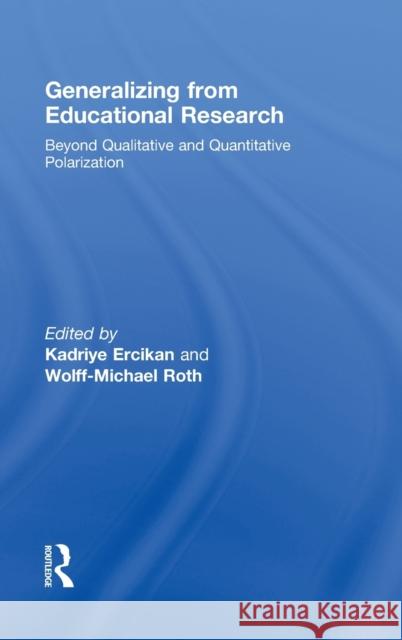Generalizing from Educational Research: Beyond Qualitative and Quantitative Polarization » książka
Generalizing from Educational Research: Beyond Qualitative and Quantitative Polarization
ISBN-13: 9780415963817 / Angielski / Twarda / 2008 / 320 str.
Generalizing from Educational Research: Beyond Qualitative and Quantitative Polarization
ISBN-13: 9780415963817 / Angielski / Twarda / 2008 / 320 str.
(netto: 784,89 VAT: 5%)
Najniższa cena z 30 dni: 730,42
ok. 16-18 dni roboczych.
Darmowa dostawa!
Tackling one of the most critical issues in education research today - how research methods are related to value and meaningfulness - this frontline volume presents an integrated approach to educational inquiry, where the focus is on creating meaningful findings that are not polarized by qualitative versus quantitative methodologies. This approach allows readers to better understand possibilities and shortcomings of different types of research.
"… a potent force for change in the field. This volume is ground-breaking, with the potential to make a major paradigm shift in thinking about educational research. It is the kind of volume that should be on the shelves of virtually everyone doing research in education."
Peter Seixas, University of British Columbia
"This book frames the major challenge facing educational researchers as one of going beyond the mindless qualitative-quantitative divide and addressing the overarching/fundamental challenge of enriching and enlarging educational inquiry. It is a signature contribution to the field."
Clifton F. Conrad, University of Wisconsin-Madison
Tackling one of the most critical issues in education research today - how research methods are related to value and meaningfulness - this frontline volume achieves two purposes. First, it presents an integrated approach to educational inquiry that works toward a continuum instead of a dichotomy of generalizability, and looks at how this continuum might be related to types of research questions asked and how these questions should determine modes of inquiry. Second, it discusses and demonstrates the contributions of different data types and modes of research to generalizability of research findings, and to limitations of research findings that utilize a single approach.
International leaders in the field take the discussion of generalizing in education research to a level where claims are supported using multiple types of evidence. The volume pushes the field in a different direction, where the focus is on creating meaningful research findings that are not polarized by qualitative versus quantitative methodologies. The integrative approach allows readers to better understand possibilities and shortcomings of different types of research.











